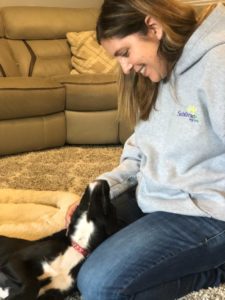Knowledge through education, skill obtained from hands-on experience and growth acquired through continued education are three excellent attributes for dog trainers. Let’s add a fourth that you may not have thought of:
Open-mindedness and Flexibility
I greatly enjoy listening to podcasts on dog training while driving from one lesson to the next. I recommend that everyone reading this blog explore different podcasts, blogs, books and articles on the subject of dog training. If you can, I suggest attending seminars too. Each of these outlets will help you gain continued knowledge in this field.
Last week, I picked a podcast on puppy nipping. I have techniques in place to stop puppy nipping, but am always on the hunt for alternate ideas. The more knowledge I gain, the better equipped I am at helping my clients overcome problems, especially if my current techniques don’t work for a particular dog.
I settled into the program, eager to learn something new. Instead, I listened to ten minutes of the speaker bash other trainers by name and every single method each trainer offered. Aside from feeling a strong distaste toward her mean-girl behavior, I couldn’t help but think she was stunting her growth as a dog trainer by isolating herself from other trainers and their techniques. Refusing to be as closed-minded as she, I pushed past my anger and forced myself to listen to the entire program in order to hear the tips she promised to provide. Then I unsubscribed, deciding I am better off following positive influences.
I use the example of the podcast to open a discussion on flexibility and training a dog with an open mind. Closing our minds to ideas and suggestions is an easy road to stumble upon in this field. No one expects you to agree with or follow techniques that do not sit well with you. There are plenty that make me cringe. Just be careful not to burn bridges. A trainer who uses a technique that you do not like, could one day provide a source of information that helps your client dog. Below are a few tips to help you avoid this common pitfall.
When it comes to clients:
When a client asks your thoughts on a technique that differs from your methods, refrain from eye rolling, snickering or insisting the technique they proposed is foolish. Instead, start a conversation.
Ask them how their dog responds to the technique and then listen to their feedback. Considering they hired a dog trainer, the method likely isn’t working for them or they simply struggle with the execution of the command. Instead of blurting, “I knew it wouldn’t work,” help them solve the problem in a constructive and positive manner.
An open dialogue demonstrates to your client that you possess knowledge, professionalism and are approachable.
When Working with Dogs:
Not all dogs learn the same. They have their own personalities, temperaments, ability to focus, and they learn differently. If a dog struggles, rather than assume he is incapable of learning, we need to realize we have yet to figure out how to teach that dog. Although your dog-training method works for most dogs, this one may require an entirely different approach. You will have to utilize different techniques to help this dog understand and learn. Do not hesitate to dig into your trainer’s toolbox and examine the different techniques you have picked up over the years. This is where respect and tolerance of other trainers comes in handy.
When It Comes to Other Dog Trainers:
Should you struggle while training a client dog, you need to turn to someone for guidance. That is only possible, if you interact with other trainers in a positive and professional manner. Most skilled trainers will happily provide insight, suggestions and referrals to one another. Those who don’t, should not be on your “go-to” list.
It is in our best interest to listen to other trainers discuss techniques they’ve used, even if the techniques are different and uncomfortable for you. Ask questions and gather as much information as possible on the topic, then file it away in your trainer’s toolbox for future reference. One day, a technique you despise, may be the only thing that works for a particular client or their dog (I am not referring to training tools. It can be any technique). That one crazy idea may be what that saves a dog from being surrendered to a kill shelter. Trust us, it happens. It is the dog trainer’s responsibility to offer their clients every opportunity to succeed with their dog. Be sure to approach everything in life with an open mind and willingness to learn.
Dinosaurs are extinct.
One final thought. Try your best not to become prehistoric in your thought process. If you refuse to open your mind to new ideas when it comes to dog training, someone else will come along and woo your clients away with their flexibility. Like dinosaurs, your prehistoric business will become extinct.
Katie McKnight
Want to study dog training? ISCDT’s 18 week online program is a hands-on program where students are required to work with dogs. Skill and ability is determined through a series of videos submitted to the school. We also offer a 2-week and 4-month in-person internship. To learn more about the courses we offer, visit ISCDT.com



